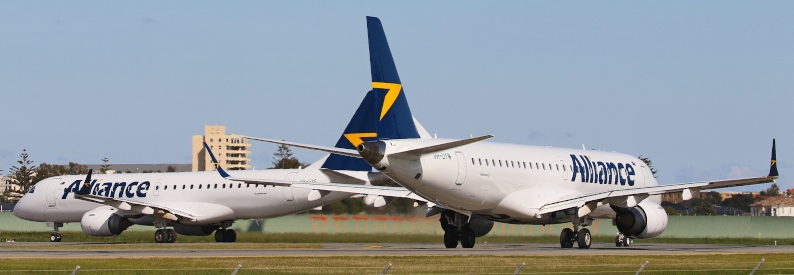Alliance Airlines (QQ, Brisbane International) has initiated a “review of wet lease contracts and business model” after surging costs caused it to issue a warning that its annual results will be “materially lower” than expected. It also launched a cost reduction programme targeting purchasing and logistics, and will proceed with the sale of non-core assets.
The airline said in a November 7, 2025, stock market disclosure that it now expected an annual EBITDA for the year ending on June 30, 2026, to be between AUD190 million and AUD210 million Australian dollars (USD123-136 million), down from analysts’ consensus of above AUD250 million (USD162 million). Alliance Airlines attributed this to a combination of factors, mostly related to the acquisition and maintenance of its aircraft.
The carrier said that the increased price of aircraft and engines, combined with higher-than-expected maintenance expenses, had inflated its depreciation charges by AUD15 million (USD9.7 million). Costs of repairs, maintenance, and logistics will be AUD12 million (USD7.8 million) higher on an annualised basis. It said it was also affected by a AUD4.2 million (USD2.7 million) “unresolved dispute” with an unnamed major customer, while the quicker-than-expected implementation of a new inventory management agreement caused an unplanned AUD3.5 million (USD2.3 million) expenditure.
While Alliance Airlines stressed that it remained profitable, with a strong cashflow and in compliance with its banking covenants, it has commissioned external advisors to review the current basis of depreciation. It also hired external advisors to evaluate its property portfolio and help identify potential assets for sale.
After the release of the guidance, the airline resumed trading on the Australian Securities Exchange (ASX) after a week-long pause.
Following the release of the updated market guidance, the airline also announced that founding manager director Scott McMillan stepped down from his role three weeks earlier than previously planned, on November 7. The company is now managed by Stuart Tully, hitherto a joint managing director.
ch-aviation data shows that Alliance Airlines operates forty-three E190s, twenty-four F100s, and twelve F70s. It also owns five more E190s, which are dry-leased out to Airnorth (Australia) until at least 2030. It has a further ten E190s due, and recently said that their deliveries will be delayed by around six months and conclude by mid-2026. Alliance Airlines operates a mix of scheduled and charter flights, mainly targeting the resources sector, and wet-leases regional capacity to both Virgin Australia (Fokker Aircraft aircraft) and Qantas (E190s).
